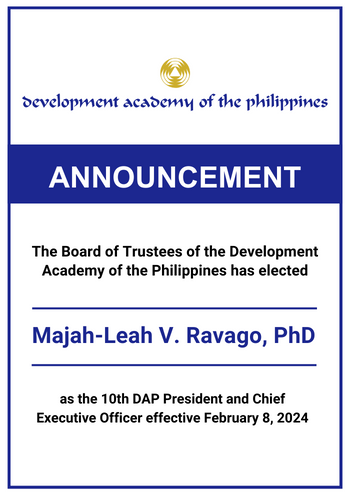The Asian Productivity Organization, through the Development Academy of the Philippines’ Center for Governance, hosted an international forum on the impact of education policies on national productivity growth held on August 14-17, 2018 at the DAP Building in Pasig City.
The forum highlighted strategies and institutional prerequisites for the optimal contribution of the education sector to supplying future-ready labor force. Distinguished research fellows from different backgrounds across the world facilitated the learning of participants in producing strategies in reforming education policies among APO member economies to cope with the future demands for the appropriate workforce.
The list of experts include Dr. Gyu-hee Hwang of the Korea Institute for Vocational and Education Training, Dr. M. Niaz Asadullah of the University of Malaya, Dr. Tae Hee Choi of the University of Hong Kong, Dr. Francesco Pastore of the University of Campania “Luigi Vanvitelli,” Dr. Tilak Jandhyala of India’s Council for Social Development, and Dr. Chandra Shah of Victoria University.
A general overview of recent issues in education and training policy in the era of the fourth Industrial Revolution and responses to these was presented to address the future workforce demands through educational reforms, partnerships, and options to skills shortages. The overview also discussed how developing countries can take advantage of the inexorable technological advancement using education and looked into the interrelationship and issues facing Asian countries amidst the perceived benefits of public-private partnerships in improving the quality and efficiency of education.
The need for educational reform was then emphasized in the context of higher demand for work-related skills that must be developed through on-the-job trainings. Likewise, direct and indirect benefits of higher education to the society, policy responses to skills shortage and the concepts, causes and perspectives pertaining to these were also explained.
The forum further identified skills needed in the 21st century in the case of information security and factors to consider in designing and implementing educational reforms to ensure their intended impact using Hong Kong’s experience. The role of labor market information in forecasting needs for skills and long-term planning for education and workforce improvement were also discussed.
Taking off from the developments in South and East Asian countries, the forum also tabbed education as the key to promote labor productivity and inclusive growth while pointing out the effects and alternatives of economic policies on financing higher education and the call for governments, companies, the education sector and families to work together to fulfill the human capital requirements of the current era.
Towards the latter part of the forum, discussions were also conducted on the methods and initiatives to measure the productivity of the education sector, strategies to acquire new talents in the era, and the prevalence of the middle-income trap as well as investing in education to overcome such trap. Similarly, the role of technical and vocational education and training in confronting the challenges of future skills needs was presented, highlighting the crucial part of teacher qualification, expertise and appraisal in preparing the future generation. Ending the forum was a data-driven explanation on the issues facing inequality in workforce development.
The outputs of the forum included action plans that address challenges in education policies of the participants’ respective countries and how they can come up with initiatives and possible actions to solve these challenges and contribute to their countries’ national productivity growth.




